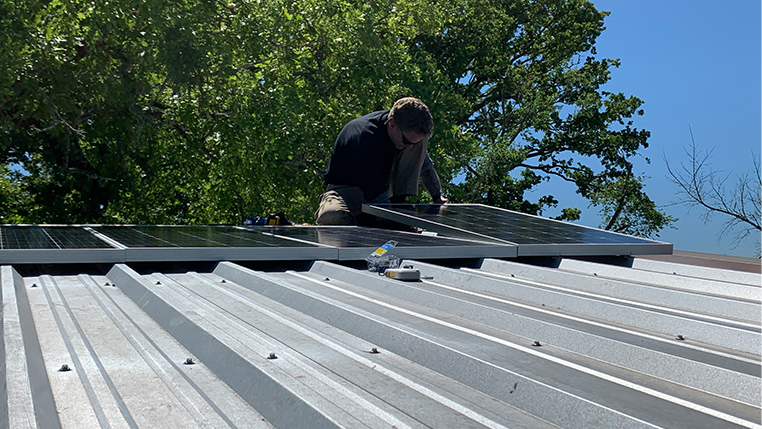10 Things to Consider Before Installing Rooftop Solar Panels
-

Are you thinking about going green and conserving energy by adding solar rooftop panels? With the advancements of solar power technology and the decreased costs – now is the time to go solar! It’s both cost-efficient and eco-friendly to power your home with solar panels, but there are some things you should know before you decide to make the switch.
Let’s take a look at the 10 most important factors to consider before installing rooftop solar panels.
1. How much sunlight does your property get?
This is one of the first questions you should ask because the answer will determine if solar panels are right for your property. Google offers a free tool called Project Sunroof that provides an accurate assessment of how much power you might generate annually with solar panels on your roof. Just input your address and see what your potential savings could be. Use a recent utility bill and enter the average amount you pay per month for electricity in the box. Project Sunroof will give you an accurate estimate of how much you can save by going solar.
2. What kind of roof do you have?
Another important question to ask early on is what kind of roof you have. For solar panel installation, concrete shingle is better than clay tile. But the good news is – solar panels can be installed on almost every kind of roof.
3. Does your roof need renovations?
A follow-up question is – what condition is your roof in? Your roof needs to be in good shape before solar panels are installed, so take care of any repairs before getting started. You can hire a roofing company to inspect your roof if you aren’t sure about its condition.
4. Should you buy or lease your solar power system?
The answer to this question depends on your finances. You’ll get the highest return on investment by buying your solar power system. When you buy and own the system, you keep saving long after you pay off the initial cost of purchase – and you can often recoup your costs with rebates and incentives. Some finance companies offer better financing than others, so shop around and find the best deal.
When you lease a solar power system, the company remains the owner of the system, and you pay them a fixed monthly rate. This option gives you cheaper electricity with little to no money upfront.
5. What Federal and state incentives are offered in your area for going solar?
Timing is everything when it comes to buying a solar energy system. The Federal tax rebate for solar systems has been extended at 26% through the end of 2022. Beginning January 1, 2023, the Federal tax rebate shrinks to 22%, and then it will be phased out entirely. So, if you’re thinking of going solar – now is the perfect time!
State incentives vary, but you can learn more about available Texas incentives here.
6. Are there any rebate options available in your state?
To help offset the cost of installing a solar panel system in your home, many states, cities, and solar companies offer rebates for installing solar panels on your roof. Before you begin your project, ask your contractor what options they have or if they can recommend rebates offered in your city and state.
Remember, the government wants people to take advantage of and invest in solar power. The Department of Energy offers up to 30% savings through tax credits and rebates, and your local electricity providers may offer additional savings.
7. Should you connect to the grid or have an off-grid system?
Most homes have a solar energy system connected to the grid. With this system, you receive Net Metering – an incentive that gives you credit on your bill from the excess power your solar panels produce.
If you use an off-grid system, it’s not connected to your city electric or utility bill. Instead, you need considerable storage capacity to save energy.
8. How do you maintain solar panels?
It’s essential to maintain your solar panels regularly to keep them working correctly. The good news is that solar panels don’t require much maintenance – simply clean them off when they get dirty! Ask your contractor for specific recommendations to keep them clean. Solar systems are incredibly reliable, but you need to make sure they continue to produce power and help you save money.
9. What about warranties?
To protect your solar panels and other related equipment, you should consider having a warranty. If something happens to your solar panels, a warranty will keep the manufacturer responsible with no additional cost to you. Some state incentive programs require you to have a warranty for your solar equipment.
Here are a few different types of warranties available to you:
- Solar Panel Warranty
This type of warranty will cover your solar panels for 25-30 years. Warranties for less than 25 years are lower than the industry standard.
- Installation Warranty
This warranty generally lasts from 2-10 years and covers circumstances where the solar panels and related equipment are installed incorrectly. Many of these warranties cover things like replacing defective parts, roof penetrations, the labor and parts related to repairing or replacing elements, and more. Ask your contractor what kind of installation warranties they provide.
- Inverter Warranty
This type of warranty varies for each company. Inverter warranties generally cover material or manufacturing flaws and defects – but they don’t cover improper installations, improper maintenance, and wear and tear caused by extreme conditions. Your contractor can give your more information about inverter warranties.
10. Can you pick the cheapest option?
Like most things, cheaper rarely means better. Yes, the technology has significantly dropped in price over the last decade, but that doesn’t mean the cheapest brands or models of solar panels are the best options. Low-end solar panels are usually manufactured in a way that makes them less durable, and when they’re less durable, your investment value and future savings decrease. Lower quality panels can also cause safety hazards, including fires. For these reasons, it’s important to invest in solar panels that will last longer and give you a much higher return.
Final Thoughts
Solar panel installation isn’t a do-it-yourself project. Too many costly things can go wrong if you aren’t trained and experienced in the installation process, including wiring problems and a leaky roof.
Adding a rooftop solar panel is one of the best choices you can make for your home. You’ll save money, decrease your carbon footprint, and increase the value of your home. Interested in learning more about solar panel installation for your home or office? Contact us today for more information!
You can read about the top seven reasons to use solar energy here.
March 23, 2021
